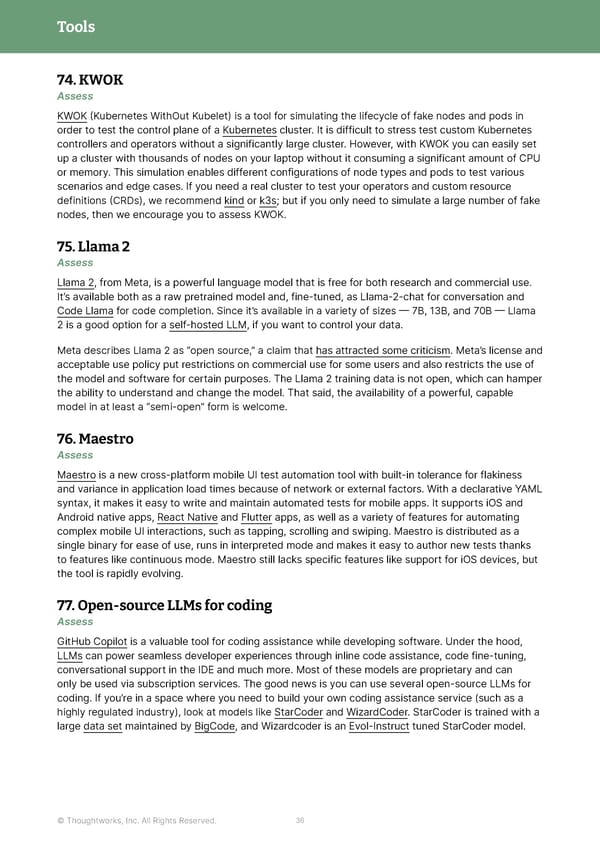Tools 74. KWOK Assess KWOK (Kubernetes WithOut Kubelet) is a tool for simulating the lifecycle of fake nodes and pods in order to test the control plane of a Kubernetes cluster. It is difficult to stress test custom Kubernetes controllers and operators without a significantly large cluster. However, with KWOK you can easily set up a cluster with thousands of nodes on your laptop without it consuming a significant amount of CPU or memory. This simulation enables different configurations of node types and pods to test various scenarios and edge cases. If you need a real cluster to test your operators and custom resource definitions (CRDs), we recommend kind or k3s; but if you only need to simulate a large number of fake nodes, then we encourage you to assess KWOK. 75. Llama 2 Assess Llama 2, from Meta, is a powerful language model that is free for both research and commercial use. It’s available both as a raw pretrained model and, fine-tuned, as Llama-2-chat for conversation and Code Llama for code completion. Since it’s available in a variety of sizes — 7B, 13B, and 70B — Llama 2 is a good option for a self-hosted LLM, if you want to control your data. Meta describes Llama 2 as “open source,” a claim that has attracted some criticism. Meta’s license and acceptable use policy put restrictions on commercial use for some users and also restricts the use of the model and software for certain purposes. The Llama 2 training data is not open, which can hamper the ability to understand and change the model. That said, the availability of a powerful, capable model in at least a “semi-open” form is welcome. 76. Maestro Assess Maestro is a new cross-platform mobile UI test automation tool with built-in tolerance for flakiness and variance in application load times because of network or external factors. With a declarative YAML syntax, it makes it easy to write and maintain automated tests for mobile apps. It supports iOS and Android native apps, React Native and Flutter apps, as well as a variety of features for automating complex mobile UI interactions, such as tapping, scrolling and swiping. Maestro is distributed as a single binary for ease of use, runs in interpreted mode and makes it easy to author new tests thanks to features like continuous mode. Maestro still lacks specific features like support for iOS devices, but the tool is rapidly evolving. 77. Open-source LLMs for coding Assess GitHub Copilot is a valuable tool for coding assistance while developing software. Under the hood, LLMs can power seamless developer experiences through inline code assistance, code fine-tuning, conversational support in the IDE and much more. Most of these models are proprietary and can only be used via subscription services. The good news is you can use several open-source LLMs for coding. If you’re in a space where you need to build your own coding assistance service (such as a highly regulated industry), look at models like StarCoder and WizardCoder. StarCoder is trained with a large data set maintained by BigCode, and Wizardcoder is an Evol-Instruct tuned StarCoder model. © Thoughtworks, Inc. All Rights Reserved. 36
 Thoughtworks Technology Radar Page 35 Page 37
Thoughtworks Technology Radar Page 35 Page 37